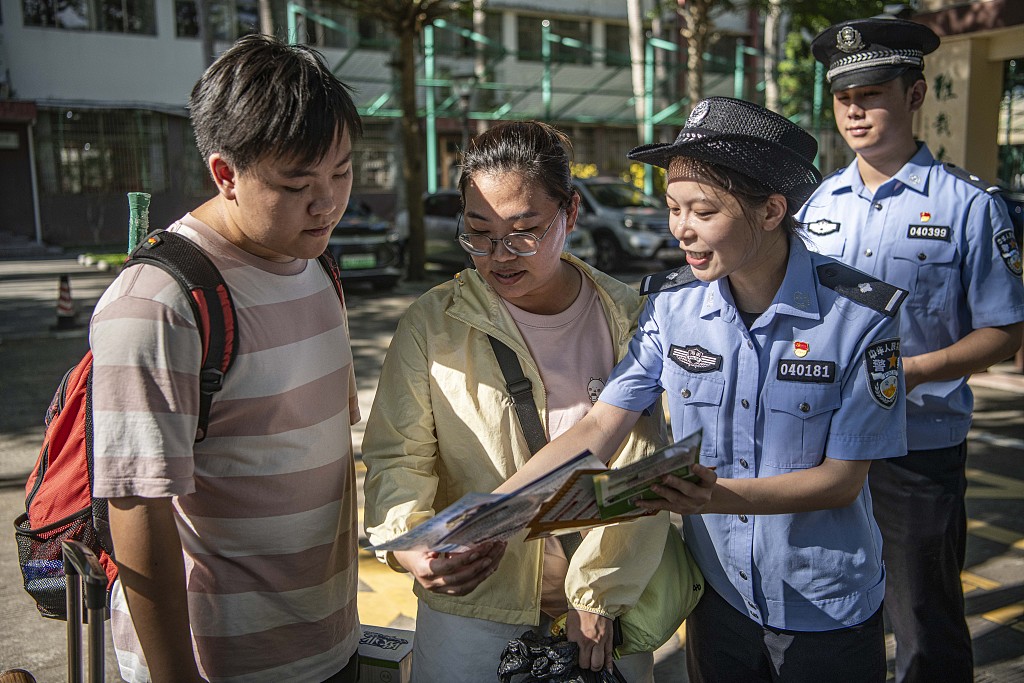Beijing pledges deeper cooperation and support for global telecom security

China proposed on Wednesday the creation of an international alliance to formulate new measures to crack down on telecommunication and cyberspace fraud, saying that such transnational crimes call for an innovative combat approach.
Minister of Public Security Wang Xiaohong made the proposal during the opening ceremony of the Global Public Security Cooperation Forum in Lianyungang, Jiangsu province.
The annual event, which was launched in 2015 as the Lianyungang Forum, brings together officials and experts from various countries to address global public security challenges.
READ MORE: Official: China cracks over 1.7 million telecom fraud cases
China's proposal for an alliance against telecom fraud came along with a series of steps it has vowed to take in the coming year to enhance international cooperation on public security.
Over the past year, China joined international efforts to crack down on illicit drugs and telecom and online fraud, Wang said, noting that China also trained more than 3,000 law enforcement officers from various countries and dispatched police advisory teams to Southeast Asia, the South Pacific, Africa and Latin America.
Over the next one year, China will train another 3,000 law enforcement officers from various countries and continue to send advisory teams to countries that have the need, he added.
Wang reaffirmed China's support for the United Nations' peacekeeping missions, saying that the country will provide financial support for training UN peacekeepers.
China is the second-largest contributor to the UN peacekeeping budget, and has deployed more peacekeepers than any other permanent member of the UN Security Council.
Jean-Pierre Lacroix, UN undersecretary-general for peace operations, urged member states "to pay their assessed contribution in full and on time". Hailing China as "a steadfast partner of the UN", he said that the nation's support for UN peacekeeping "is a clear reflection of its commitment to international peace and security".
Public Security Minister Wang said that destabilizing factors and uncertainties are increasing worldwide, and global public security "is faced with unprecedented challenges and diverse dangers".
He called for upholding sovereign equality, the international rule of law, multilateralism, and a people-and action-oriented approach to make global security governance more equitable and efficient.
Speaking on counternarcotics, Wang said that China has fulfilled its international duties to combat synthetic drugs and precursor chemicals, and it has provided assistance to countries facing fentanyl and other synthetic opioid abuse crises.
"We must follow the principle of shared responsibility and comprehensive balance to address the issue of illicit drugs, work hard to reduce the demand for illicit drugs, and engage actively in effective international cooperation," he said.
Wednesday's opening ceremony followed a subforum on international counterterrorism cooperation, where participants emphasized the need for new measures, as terrorist groups exploit emerging technologies.
ALSO READ: Guideline targets cybercrime enablers
The fruits of the latest round of technological revolution are being abused by terrorist groups, said Chen Zhimin, chairman of the China Association for Friendship.
Many developing countries and those on the front line of combating terrorism lack digital infrastructure, talent and investment to cope with new threats, Chen said, adding that more resources should be channeled to them.
Zhang Lixun, Party secretary of the China People's Police University, said that priorities should be given to tackling "digital terrorism". He also called for stronger international cooperation to spur economic growth in developing countries, improve livelihoods, and reduce the risks of radicalization.
Contact the writer at wangqingyun@chinadaily.com.cn


